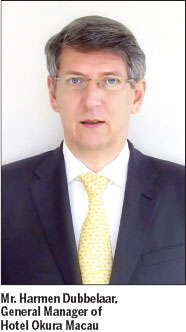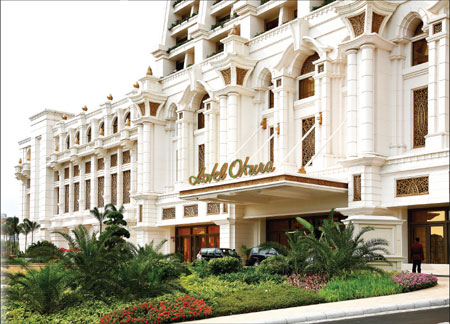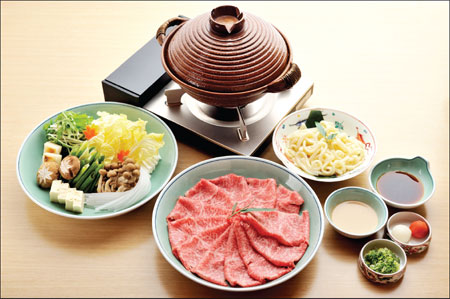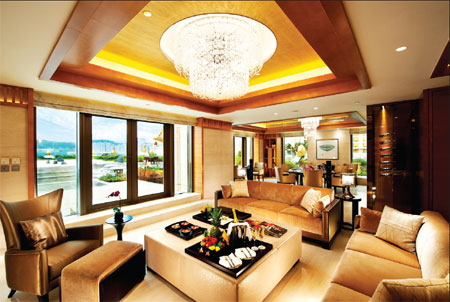Invoking Kaizen for a memorable stay
Updated: 2013-01-25 06:45
(HK Edition)
|
|||||||

Twenty months since the opening of the Hotel Okura Macau at Galaxy Macau, the Japan-based operator has achieved a consistently high occupancy of over 90 percent. But Harmen Dubbelaar, general manager of the hotel, says he always watches out for complacency in the pursuit of Kaizen (改善) - the Japanese philosophy of looking for improvement in every aspect.
The lobby of Hotel Okura Macau underlines the hotel chain's Japanese root with floor-to-ceiling shoji windows - sliding windows made of a latticed screen covered with white paper, and a sloped ceiling covered by wood panels. The art installation behind the front desk adds to the harmonious setting, though the focal point is really the bonsai-inspired floral arrangement made up of over a hundred orchid plants.
The tranquil ambience, strengthened by the timber interiors in the hallways and a lovely fragrance wafting throughout the public spaces, leads the guests to the 488 tastefully appointed guest rooms. And after a courtesy turndown service, they will spot an Okura signature origami sitting on each of the duvet-covered beds.
If you think the hotel has called an outsourcer to deliver all the origamis, think again. "All our departments (handmake) these for the guests," says Dubbelaar. "It comes from the heart. We want to say to (our) guests, we wish you a very good night of rest."
The Macau property prides itself on delivering "moments of kindness" and Dubbelaar ensures attention is paid to every detail in every aspect of the hotel. One of the touches is that housekeepers will turn vacuum cleaners off when guests pass by until they are out of earshot.
"It's something that you may not even notice, but it's there. Because the guest does not pay for the noise of a vacuum cleaner," says Dubbelaar.
While the indoors put emphasis on interiors of simple elegance and outstanding service, the outdoor is all relaxation and fun: The tropical-themed resort deck or fun in the wave pool, shared by two other hotels in the Galaxy Macau complex.
When the Dutch hotelier was appointed to set up and run the Macau venture in late 2008, he admits he had doubts about turning the massive construction site in the middle of Cotai into a tropical resort that would feel like Bali. But as he looks out at the deck from the hotel's flagship Imperial Suite, he says guests will easily forget where they are as they relax underneath the palm trees.
"This destination works," Dubbelaar says. The proof: The three hotels at Galaxy Macau have been running either at over 90 percent occupancy on average or are fully booked.
"I say we are very lucky as it's every hotel manager's dream to have a hundred percent occupancy. Once you have reached that level of occupancy, you can really test your organization whether (it) can truly deliver the experience," says Dubbelaar. "That's what we are trying to accomplish every day."
But complacency is to be kept at bay. At Okura, Dubbelaar compares his role to the conductor of an orchestra and is keen to pursue the Japanese managerial philosophy of Kaizen, which stands for the continuous search for improvement. Apart from maintaining service quality, his team also responds to the needs of hotel guests that were not anticipated before opening.
Hotel Okura Macau was opened with Yamazato, the chain's signature Japanese restaurant, and the Terrace Restaurant serving both Western-style and Asian dishes. Then as demand grew for Chinese cuisine, the hotel introduced a dim sum lunch set that was met with great enthusiasm.
And when reputation grew with its delivery of service and outstanding Chinese cuisine, the Okura began to host wedding banquets at its meeting rooms to meet the emerging demand. "You can't make mistakes in weddings," Dubbelaar underscores the challenge.
Guests at the Macau hotel are predominantly leisure travelers; about 40 percent of them are short-stay guests from Hong Kong, who are demanding. "As far as I am concerned, they have the right to be (demanding). Because you have created that expectation, you better make sure you deliver," says Dubbelaar.
Dubbelaar is witness to the emerging affluence of Asian travelers. When he worked at the Okura Garden Hotel in Shanghai during the early '90s, he used to wander through the streets of Shanghai on a bike. As he returned to China to run the Macau venture, he has met Asian guests who are much more affluent and well-spoken.
Across the river, the Okura Macau looks out to massive construction sites on the Hengqin Island of Zhuhai, which will become the new campus of the University of Macau and the Shizimen central business district.
Given what he has witnessed in Shanghai, Dubbelaar believes the fascinating developments and new transport links in the Pearl River Delta will eventually improve the quality of life of the people, who will increasing appreciate the rewarding experience of vacation.
"I just love to see that development and the affluence. The people really enjoy life and travel and come to Macau, stay at the Galaxy, have a good time and learn new things. I think that is what brings the world together, regardless of where you are from," he says.



(HK Edition 01/25/2013 page10)